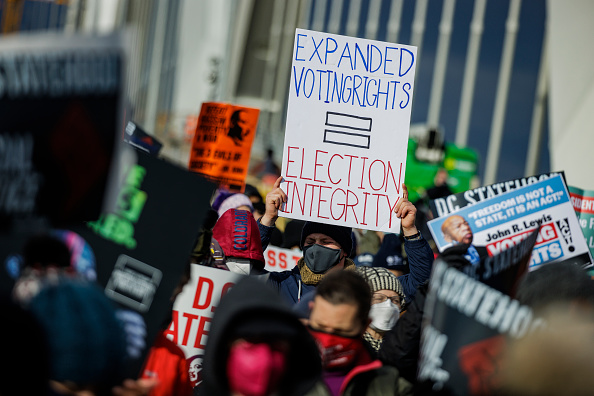Législation
Élargir le droit de vote dans l'Indiana

Élargir les droits de vote et les élections
Les lois électorales de l'Indiana sont parmi les plus restrictives du pays. Le résultat ? Selon le dernier indice de santé civique de l'Indiana, en 2022, l'Indiana se classait au 50e rang.ème En ce qui concerne la participation électorale dans tous les États et dans le District de Columbia, seule la Virginie Occidentale a enregistré une participation plus faible. Le redécoupage partisan est un facteur important dans nos problèmes de participation électorale. Dans de trop nombreuses régions de l'État, les circonscriptions électorales de l'État et du Congrès ont été dessinées de manière à favoriser fortement un parti par rapport à l'autre.
Mais le redécoupage électoral n'est pas la seule raison de nos statistiques de participation désastreuses. Les lois électorales de l'Indiana sont pleines d'obstacles bureaucratiques qui peuvent priver les électeurs de leur droit de vote. Les délais trop courts et les exigences restrictives en matière d'identification ont un impact particulier sur les électeurs peu fréquents ou vulnérables, comme les personnes âgées, les électeurs handicapés et les étudiants.
Common Cause Indiana soutient les politiques électorales et de réforme du vote suivantes.
- Inscription des électeurs le jour du scrutin
- Inscription automatique des électeurs pour les résidents de 18 ans
- Prolongation des heures d’ouverture des bureaux de vote de 18 h à 18 h à 18 h à 20 h
- Vote par correspondance sans excuse
- Demande permanente de vote par correspondance par correspondance
- Commission citoyenne de redécoupage des circonscriptions électorales pour les États et le Congrès
Session législative 2024 : l'Assemblée générale adopte une loi électorale inutile et inconstitutionnelle
L'Assemblée générale de l'Indiana a aggravé la situation en adoptant le projet de loi HB1264, qui se fonde sur la fausse idée que les élections dans l'Indiana sont vulnérables à la fraude. La nouvelle loi contient un certain nombre de dispositions susceptibles de priver les électeurs de l'Indiana de leurs droits. Common Cause Indiana a dirigé un grand groupe d'organisations alliées qui se sont opposées à ce projet de loi, mais malheureusement, il a été adopté selon les lignes du parti et a été signé par le gouverneur Holcomb. Nous travaillons actuellement avec certains de ces alliés pour faire preuve de la diligence nécessaire afin de nous préparer à une contestation judiciaire. Nous nous sommes opposés à ce projet de loi pour les raisons suivantes :
- S'appuyant sur la fausse croyance selon laquelle des non-citoyens votent aux élections de l'Indiana, cette nouvelle loi comparera une liste du Bureau of Motor Vehicles des non-citoyens ayant reçu des cartes d'identité temporaires avec la liste des électeurs inscrits. Si une personne apparaît sur les deux listes, elle sera présumée être non-citoyenne et aura 30 jours pour prouver son statut de citoyen, ou elle sera radiée des listes électorales. Le problème est que les informations du BMV sont susceptibles d'être obsolètes ; elles pourraient dater de huit ans. Ainsi, cette nouvelle disposition identifiera à tort de nombreux nouveaux citoyens comme des non-citoyens et remettra en cause leur statut de vote. Ce n'est pas seulement une façon horrible de traiter les nouveaux Hoosiers, c'est aussi inconstitutionnel car tous les électeurs méritent un traitement égal.
- La loi 1264 sur l'inscription des électeurs à la Chambre des représentants permettra à l'État d'utiliser les informations du bureau de crédit Experian et d'autres sources commerciales pour les comparer à la liste électorale afin de tenter de purger les électeurs inscrits à d'anciennes adresses. Tout comme les informations du Bureau of Motor Vehicles, ces informations pourraient être obsolètes ou erronées, ce qui pourrait conduire à ce que des inscriptions électorales légitimes soient ciblées à tort pour être purgées.
- La loi 1264 sur l'inscription des électeurs à la Chambre des représentants modifie fondamentalement une loi en vigueur depuis plus de 20 ans. Si une personne ne fournit pas son numéro de permis de conduire ou les 4 derniers chiffres de son numéro de sécurité sociale sur une demande d'inscription électorale remise en main propre au bureau d'inscription des électeurs, la demande ne sera pas entièrement traitée tant que la personne n'aura pas fourni une preuve supplémentaire de résidence. Cela aura un impact disproportionné sur les étudiants et les jeunes électeurs novices, ainsi que sur les personnes handicapées et les personnes âgées qui vivent dans des lieux collectifs.
- La loi 1264 sur l'inscription des électeurs permettra aux comtés de contester la demande d'inscription électorale d'un individu s'ils estiment que celui-ci a soumis une adresse « non résidentielle ». Étant donné que les lois de zonage peuvent changer et ne sont pas cohérentes, cette section pourrait entraîner la contestation d'inscriptions légitimes.
Impact de la loi 1334 sur l'inscription à la Chambre (session législative de 2023)
L'Assemblée générale de 2023 a adopté la loi 1334 sur l'inscription à la Chambre des représentants, qui oblige toute personne souhaitant voter par correspondance à soumettre son numéro d'identification d'électeur. Le problème avec cette exigence est que le numéro d'identification d'électeur d'un individu peut être l'un des trois numéros (numéro de permis de conduire, les 4 derniers du SSN ou un numéro arbitraire attribué par l'État) et généralement l'électeur ne sait pas lequel figure dans son dossier. Le CCIN a recherché le nombre d'électeurs dont la demande a été rejetée en raison de cette exigence inutile afin de constituer un dossier pour contester cette loi néfaste.
